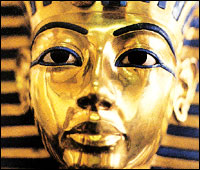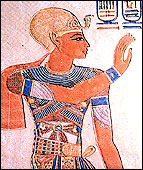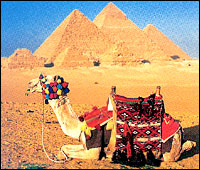NextGen Day: Travel, Hotels, Flights, Vacations, Holidays

| NextGen Day - Trip Holidays - Egypt Hotels, Vacations & Tourism - Egypt Travel Information |
ADVERTISEMENT |
NextGen Day Egypt
History Egypt has endured as a unified state for more than 5,000 years, and archeological evidence indicates that a developed Egyptian society has existed for much longer. Egyptians take pride in their "pharaonic heritage" and in their descent from what they consider mankind's earliest civilization. The Arabic word for Egypt is Misr, which originally connoted "civilization" or "metropolis." Archeological findings show that primitive tribes lived along the Nile long before the dynastic history of the pharaohs began. By 6000 B.C., organized agriculture had appeared. In about 3100 B.C., Egypt was united under a ruler known as Mena, or Menes, who inaugurated the 30 pharaonic dynasties into which Egypt's ancient history is divided--the Old and the Middle Kingdoms and the New Empire. For the first time, the use and managements of vital resources of the Nile River came under one authority. The pyramids at Giza (near Cairo) were built in the fourth dynasty, showing the power of the pharaonic religion and state. The Great Pyramid, the tomb of Pharaoh Khufu (also known as Cheops), is the only surviving example of the Seven Wonders of the Ancient World. Ancient Egypt reached the peak of its power, wealth, and territorial extent in the period called the New Empire (1567-1085 B.C.). Authority was again centralized, and a number of military campaigns brought Palestine, Syria, and northern Iraq under Egyptian control. Persian, Greek, Roman, and Arab Conquerors In 525 B.C., Cambyses, the son of Cyrus the Great, led a Persian invasion force that dethroned the last pharaoh of the 26th Dynasty. The country remained a Persian province until Alexander the Great. The Roman/Byzantine rule of Egypt lasted for nearly 700 years. Following a brief Persian reconquest, Egypt was invaded and conquered by Arab forces in 642. A process of Arabization and Islamization ensued. Although a Coptic Christian minority remained--and remains today, constituting about 10% of the population--the Arab language inexorably supplanted the indigenous Coptic tongue. Ancient Egyptian ways--passed from pharaonic times through the Persian, Greek, and Roman periods and Egypt's Christian era--were gradually melded with or supplanted by Islamic customs. For the next 1,300 years, a succession of Turkish, Arabic, Mameluke, and Ottoman caliphs, beys, and sultans ruled the country. European Influence Napoleon Bonaparte arrived in Egypt in 1798. The three-year sojourn in Egypt (1798-1801) of his army and a retinue of French scientists opened Egypt to direct Western influence. Napoleon's adventure awakened Great Britain to the importance of Egypt as a vital link with India and the Far East and launched 150 years of Anglo-French rivalry over the region. An Anglo-Ottoman invasion force drove out the French in 1801, and, following a period of chaos, the Albanian Mohammed Ali obtain control of the country. Ali ruled until 1849, and his successors retained at least nominal control of Egypt until 1952. He imported European culture and technology, introduced state organization of Egypt's economic life, improved education, and fostered training in engineering and medicine. His authoritarian rule was also marked by a series of foreign military adventures. Ali's successors granted to the French Promoter, Ferdinand de Lesseps, a concession for construction of the Suez Canal--begun in 1859 and opened 10 years later. Their regimes were characterized by financial mismanagement and personal extravagance that reduced Egypt to bankruptcy. These developments led to rapid expansion of British and French financial oversight. This produced popular resentment, which, in 1879, led to revolt. In 1882, British expeditionary forces crushed this revolt, marking the beginning of British occupation and the virtual inclusion of Egypt within the British Empire. During the rule of three successive British High Commissioners between 1883 and 1914, the British agency was the real source of authority. It established special courts to enforce foreign laws for foreigners residing in the country. These privileges for foreigners generated increasing Egyptian resentment. To secure its interests during World War I, Britain declared a formal protectorate over Egypt on December 18, 1914. This lasted until 1922, when, in deference to growing nationalism, the U.K. unilaterally declared Egyptian independence. British influence, however, continued to dominate Egypt's political life and fostered fiscal, administrative, and governmental reforms. In the post-independence period, three political forces competed with one another: the Wafd, a broadly based nationalist political organization strongly opposed to British influence; King Fuad, whom the British had installed during the war; and the British themselves, who were determined to maintain control over the canal. Although both the Wafd and the King wanted to achieve independence from the British, they competed for control of Egypt. Other political forces emerging in this period included the communist party (1925) and the Muslim Brotherhood (1928), which eventually became a potent political and religious force. During World War II, British troops used Egypt as a base for Allied operations throughout the region. British troops were withdrawn to the Suez Canal area in 1947, but nationalist, anti-British feelings continued to grow after the war. Violence broke out in early 1952 between Egyptians and British in the canal area, and anti-Western rioting in Cairo followed. On July 22-23, 1952, a group of disaffected army officers led by Lt. Col. Gamal Abdel Nasser overthrew King Farouk, whom the military blamed for Egypt's poor performance in the 1948 war with Israel. Following a brief experiment with civilian rule, they abrogated the 1923 constitution and declared Egypt a republic on June 19, 1953. Nasser evolved into a charismatic leader, not only of Egypt but of the Arab world. Nasser and his "free officer" movement enjoyed almost instant legitimacy as liberators who had ended 2,500 years of foreign rule. They were motivated by numerous grievances and goals but wanted especially to break the economic and political power of the land- owning elite, to remove all vestiges of British control, and to improve the lot of the people, especially the fellahin (peasants). A secular nationalist, Nasser developed a foreign policy characterized by advocacy of pan-Arab socialism, leadership of the "nonaligned" of the "Third World," and close ties with the Soviet Union. He sharply opposed the Western-sponsored Baghdad Pact. When the United States held up military sales in reaction to Egyptian neutrality vis-a-vis Moscow, Nasser concluded an arms deal with Czechoslovakia in September 1955. When the U.S. and the World Bank withdrew their offer to help finance the Aswan High Dam in mid-1956, he nationalized the privately owned Suez Canal Company. The crisis that followed, exacerbated by growing tensions with Israel over guerrilla attacks from Gaza and Israeli reprisals, resulted in the invasion of Egypt that October by France, Britain, and Israel. While Egypt was defeated, the invasion forces were quickly withdrawn under heavy pressure from the U.S. The Suez war (or, as the Egyptians call it, the Tripartite Aggression) accelerated Nasser's emer |


